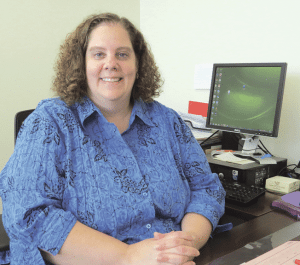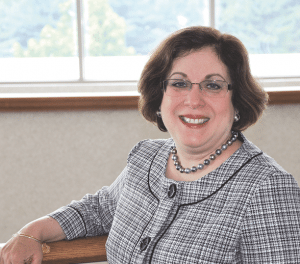Landing Gear
Colleges Work to Help Students Open Doors to Opportunity

Bay Path College’s Laurie Cirillo says the job market has improved, but there are still many challenges awaiting job seekers.
That’s the phrase one hears repeatedly from area college career-services professionals as they talk about the overall job market and the prospects for members of the class of 2013.
Roughly translated, those two words, or others used to convey the same sentiment, imply that conditions are certainly better than they were a few years ago, when, in the wake of the Great Recession, many sectors — including financial services, law, retail, and even healthcare — sharply curtailed their hiring, forcing many to stay in school or take jobs in fields other than the one they chose.
But while the skies have brightened slightly — moreso in the technical and healthcare-related fields than others — the job market is still challenging in many respects, said Laurie Cirillo, executive director of the Sullivan Career and Life Planning Center at Bay Path College. She noted that, while a large number (25% or more) of the school’s graduates go on to seek advanced degrees, those choosing to enter the job market are facing everything from stern competition — including many members of those classes that graduated during or just after the recession — to some lingering reluctance on the part of some employers to add to their payrolls.
“Given the fact that we have a positive job-growth outlook for the state, we’re preliminarily seeing our students have more success and find opportunities locally,” she said of the overall job market. “But there is a lot of competition for these opportunities.”
In this environment, said Cirillo and others we spoke with, candidates need any advantages they can get, and area colleges are becoming both diligent and imaginative in helping them find some.
These initiatives include everything from encouraging and creating experiential learning experiences — including internships, practicums, and co-ops — to networking events and career fairs designed to introduce students to employers, to programs providing help with résumé and interviewing skills.
Summing up these efforts, Jeanette Doyle, director of the Career Center at Springfield College, said they enable students to become better able to sell themselves to potential employers — a skill, or trait, that many need help with.
“Most students are too humble,” she noted, referring, generally, to how they respond to interviewers’ questions. “It’s always about selling your skills and qualifications. We have to remind them to go out and market themselves in the most positive light, and they have to remind themselves that they’re competing against other people for these jobs.”
Much of the focus today is on experiential learning, especially internships, which can bring a number of benefits for students and employers alike, said Candace Serrafino, interim director of Career Services at UMass Amherst, who noted that the school was recently ranked among the top 10 schools in the country by US News & World Report when it comes to students participating in internships.
For companies, she noted, interns can provide everything from technical skills to important generational perspective, to an additional hand when when many employers need one or more. For students, she added, they provide hands-on experience, insight into the working world, and an introduction to a company that might become an employer.

Jeanette Doyle says the primary objective of career center activities at Springfield College is to help students become more adept at selling themselves to employers.
At Baypath, internships are required, said Cirillo, adding that, overall, the school has been successful in forging partnerships with area employers, such as Baystate Health, on a number of experiential learning opportunities that help prepare students for life after graduation.
For this issue and its focus on employment, BusinessWest talked with a number of area career-services professionals about both the state of the job market and ways colleges are working to open more doors for their graduates by making it easier to sell themselves to employers.
Degrees of Progress?
Those we spoke with said it will be perhaps six months or more before they’ll have anything approaching hard data on how well the class of 2013 is faring when it comes to entering the job market — and in their chosen field.
That’s when most surveys of graduates, revealing if, when, and where they’ve found employment, are compiled, said Maria Cokotis, career counselor in the College of Business at Western New England University. But she and others noted that there is plenty of anecdotal evidence to warrant the use of the phrase ‘marginal improvement’ or words slightly more positive.
And that aforementioned evidence comes in many forms, from the number of employers taking part in career fairs staged over the past several months to the wide range of companies that are hiring — from Enterprise Rent-a-Car to Health New England to a host of retailers, such as TJX.
“There are signs that the job market has gotten better since last year,” said Cokotis, adding quickly that there are caveats involving those who have found success, These include the field in question, flexibility with regard to geography — meaning those willing to relocate, especially to larger urban areas — experiential learning, and being realistic when it comes to expectations and a willingness to accept something less than the ideal job if doing so will start a career down the right path.
“If someone’s in information technology and is willing to relocate, there are a lot of opportunities that will present themselves,” she said, referring to one field along the spectrum.
“It’s also important for students to focus on the first job not as the ultimate career move, but a first step in their career,” she continued. “They should be thinking about where they can go to develop and apply some solid skills that will provide a stepping stone to the next position that they want to go to. Sometimes, students have a very idealistic outlook as to what they want in their first job, but they have to look at the realities of building on experience that will begin to carve a career path.”

Maria Cokotis, a career counselor in the College of Business at Western New England University, says job seekers must be realistic in their expectations when it comes to that first job.
“Anecdotally, what we’re seeing is that things are picking up slowly,” she said, putting some additional emphasis on that last word. “Certainly, some of the technical majors, such as our engineering students and our computer science students, are finding greater opportunities than our non-technical students, and our finance, operations, and accounting students are also faring well.
“We serve a lot of liberal-arts and sciences students, and for them, it’s a little softer market,” she went on. “But it certainly becomes firmer when a student has an internship or a co-op under their belt.”
Serrafino said that one of the more encouraging developments with regard to the market has been strong attendance among employers at the school’s four annual career fairs — one staged by the Isenberg School of Management, another for engineering students, the Alana fair (involving minority students), and the campus-wide Career Blast, staged in February, the largest of the events.
“We broke all records — the number of employers increased significantly, as well as the number of students participating,” she said, noting, as one example, that the engineering fair drew 91 employers and 1,350 students. A year ago, those numbers were 78 and 1,100, respectively. At the Career Blast, there were 141 employers and 2,000 students (most from UMass, but also others from surrounding schools). In 2012, only 98 employers showed up.
As impressive as the quantity of employers was the variety, she went on, noting that the list of participants included GE, ISO New England, Health New England, Liberty Mutual, Macy’s, General Dynamics, Hanover Insurance, and MGM Resorts International.
And while companies take part for several reasons — some are recruiting intern candidates or simply maintaining visibility, for example — many have been hiring this year.
Courses of Action
While the employment scene is brightening somewhat, entering the job market remains challenging, said Cirillo, adding that Bay Path, like other schools, is being aggressive in its work to help students better compete for jobs in their chosen field, and be prepared to succeed in those professions.
Internships and co-ops are a big part of the equation, she said, but the school goes further, with such initiatives as the Sullivan Center’s career and networking events that, as the name suggests, are designed to provide career education and networking opportunities customized to a major field of study. The sessions, staged throughout the spring, include keynote presentations, panelists discussing their careers, and structured networking.
There are sessions for legal studies, business, education, psychology, criminal justice, and science, said Cirillo, noting, for example, that speakers and panelists for the criminal-justice event included John Gibbons, U.S. marshal for the District of Massachusetts; Margaret Oglesby, assistant chief probation officer for Springfield District Court; Col. Timothy Alben, superintendent of the Massachusetts State Police; and Lucy Sotto-Abbe, Massachusetts Parole Board member, among others.
Another somewhat unique program at Bay Path is a career-shadowing program in which first- and second-year students go out into the field and spend some time with people in the profession they’ve targeted.
“It gives that first-year student a chance to really define the difference between what a job is like in their imagination and what it’s like in reality,” she explained, using forensic science, with expectations created by TV shows such as CSI, as one example. “We also encourage students to interview professionals working in the field and find out what their career stories are, and thus learn how they got to where they are, what kinds of career competencies they think are important for people in that field, and what their daily life and challenges are like.
“Getting in touch with professionals and being able to career shadow helps that first- or second-year student crystallize, or develop some confidence in, their major early on,” Cirillo continued. “Or, it might prompt them to say, ‘I thought I wanted to do this, but I don’t, so now I’ll do this instead.’ Developing confidence in the major early on is important.”
Meanwhile, it’s important for the student to have confidence as they go about their job search and take on those first job interviews. And that’s why many area schools have created programs to help them tackle those assignments.
Such initiatives range from UMass Amherst’s ‘Resumania,’ program, a four-day blitz during which career-services staff members prepare and update hundreds of résumés, to a host of efforts involving the art and science of interviewing, to seminars on the effective use of social media in a job search.
At Springfield College, said Doyle, the school brings alums back on campus to talk with seniors about what they’ll experience during a job search, at their first interview, and after they’ve been hired. It’s part of a larger effort to take learning beyond the classroom, she said, and prepare students for the workplace.
As part of this initiative, career-services staff members, sometimes working with alumni, conduct mock interviews with students, asking many of the tough, behavioral-based questions that are part and parcel to interviews today, and, overall, preparing them for something unlike anything they’ve experienced.
“Sometimes, students are surprised — they’ll say, ‘I was there for six hours; I had no idea it was going to be like this,’” she noted. “It’s still an employer’s market — there are a lot of candidates, and for them to pick the best one, they have to do their due diligence. We just want to help students be ready.”
At UMass, assistance also includes something that Serrafino called “job-fair prep workshops.” There were roughly a dozen conducted over the past year, she said, adding that they focused on everything from proper dress and body language to the questions they can expect.
“We teach the students to be able to market themselves in a 30-second infomercial,” she explained, “and focus on such things as how to greet an employer and how to put their best foot forward in a few moments, and not go up to someone and say, ‘so, what kind of jobs do you have here?’”
Happy Landing
Time will tell just how well the class of 2013 fares with its efforts to break into the job market. As those we spoke with said, there are many signs they will do better overall than those in many recent classes.
Meanwhile, the task at hand for area colleges is to continue to be imaginative with programs to help improve students’ odds and, overall, open more doors.
George O’Brien can be reached at [email protected]




